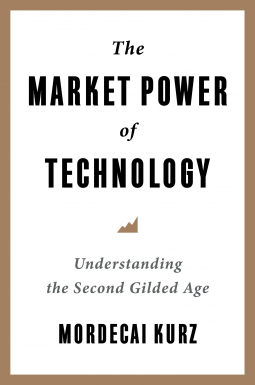Please wait... This may take a moment.
The Market Power of Technology
Understanding the Second Gilded Age
This title was previously available on NetGalley and is now archived.
Pub Date
Jan 03 2023
| Archive Date
Apr 12 2023
Description
Since the 1980s, the United States has regressed to a level of economic inequality not seen since the Gilded Age in the late nineteenth century. At the same time, technological innovation has transformed society, and a core priority of public policy has been promoting innovation. What is the relationship between economic inequality and technological change?
Mordecai Kurz develops a comprehensive integrated theory of the dynamics of market power and income inequality. He shows that technological innovations are not simply sources of growth and progress: they sow the seeds of market power. In a free market economy with intellectual property rights, firms’ control over technology enables them to expand, attain monopoly power, and earn exorbitant profits. Competition among innovators does not eliminate market power because technological competition is different from standard competition; it results in only one or two winners. Kurz provides a pioneering analysis grounded on quantifying technological market power and its effects on inequality, innovation, and economic growth. He outlines what causes market power to rise and fall and details its macroeconomic and distributional consequences.
Kurz demonstrates that technological market power tends to rise, increasing inequality of income and wealth. Unchecked inequality threatens the foundations of democracy: public policy is the only counterbalancing force that can restrain corporate power, attain more egalitarian distribution of wealth, and make democracy compatible with capitalism. Presenting a new paradigm for understanding today’s vast inequalities, this book offers detailed proposals to redress them by restricting corporate mergers and acquisitions, reforming patent law, improving the balance of power in the labor market, increasing taxation, promoting upward mobility, and stabilizing the middle class.
Since the 1980s, the United States has regressed to a level of economic inequality not seen since the Gilded Age in the late nineteenth century. At the same time, technological innovation has...
Description
Since the 1980s, the United States has regressed to a level of economic inequality not seen since the Gilded Age in the late nineteenth century. At the same time, technological innovation has transformed society, and a core priority of public policy has been promoting innovation. What is the relationship between economic inequality and technological change?
Mordecai Kurz develops a comprehensive integrated theory of the dynamics of market power and income inequality. He shows that technological innovations are not simply sources of growth and progress: they sow the seeds of market power. In a free market economy with intellectual property rights, firms’ control over technology enables them to expand, attain monopoly power, and earn exorbitant profits. Competition among innovators does not eliminate market power because technological competition is different from standard competition; it results in only one or two winners. Kurz provides a pioneering analysis grounded on quantifying technological market power and its effects on inequality, innovation, and economic growth. He outlines what causes market power to rise and fall and details its macroeconomic and distributional consequences.
Kurz demonstrates that technological market power tends to rise, increasing inequality of income and wealth. Unchecked inequality threatens the foundations of democracy: public policy is the only counterbalancing force that can restrain corporate power, attain more egalitarian distribution of wealth, and make democracy compatible with capitalism. Presenting a new paradigm for understanding today’s vast inequalities, this book offers detailed proposals to redress them by restricting corporate mergers and acquisitions, reforming patent law, improving the balance of power in the labor market, increasing taxation, promoting upward mobility, and stabilizing the middle class.
Advance Praise
"In an era of dominance of IT firms, a sector which has been long known for its strong tendency for monopolization, The Market Power of Technology provides important reasoning and substantiation of how this increasing industrial concentration goes hand in hand with the income inequalities of our time."
--Nicholas S. Vonortas, editor of Science and Public Policy
"In an era of dominance of IT firms, a sector which has been long known for its strong tendency for monopolization, The Market Power of Technology provides important reasoning and substantiation of...
Advance Praise
"In an era of dominance of IT firms, a sector which has been long known for its strong tendency for monopolization, The Market Power of Technology provides important reasoning and substantiation of how this increasing industrial concentration goes hand in hand with the income inequalities of our time."
--Nicholas S. Vonortas, editor of Science and Public Policy
Available Editions
| EDITION |
Other Format |
| ISBN |
9780231206532 |
| PRICE |
$40.00 (USD)
|
Available on NetGalley
NetGalley Shelf App
(EPUB)
Send to Kindle (EPUB)
Download (EPUB)
Additional Information
Available Editions
| EDITION |
Other Format |
| ISBN |
9780231206532 |
| PRICE |
$40.00 (USD)
|
Available on NetGalley
NetGalley Shelf App
(EPUB)
Send to Kindle (EPUB)
Download (EPUB)
Average rating from 2 members




